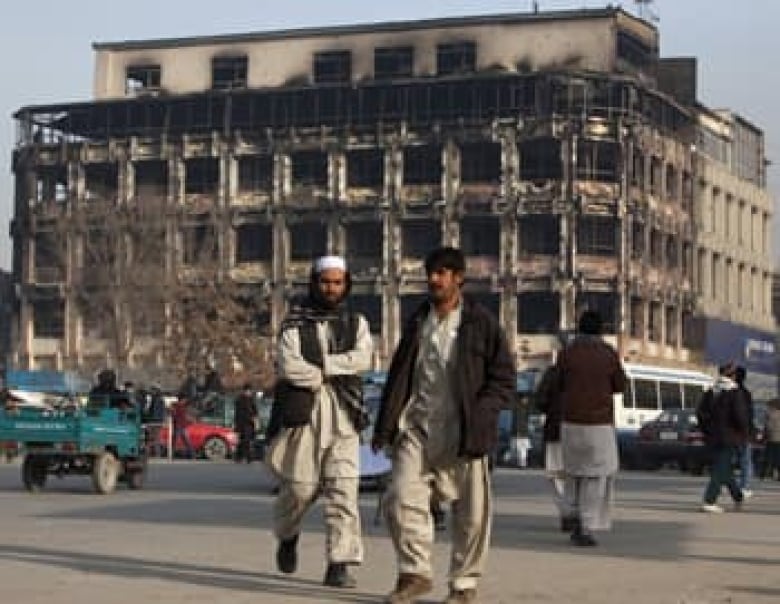The new Afghan battle plan, bribing the Taliban
The leaders and foreign ministers from the almost 70 nations attending the London Conference on Afghanistan this week are being reminded that one of the most important aspects of COIN is cash.
COIN is the military term for counter-insurgency and the cash in question is the money being put aside to seduce enemy fighters into giving up their arms.
Taliban guerrillas, having proven ruggedly resilient in the face of NATO bombs, bullets and battalions, are about to face bribes.

What's more, NATO is not going after just a few turncoats. It hopes thousands of impoverished Taliban insurgents will seize what could amount to the first decent pay and steady job they've ever had.
Well, that's the plan and I'm only surprised it hasn't been pursued aggressively long before this grim point in a war that's not going well. For years, Canadian officers have been calling for a massive job-creating economic offensive to lure guerrillas away from the insurgency.
No one really knows whether bribery will work on a large scale. Still, the thinking goes, it is probably worth the gamble.
So allied governments are preparing to put $100 million into something called the Reintegration and Reconciliation Program, aimed at lower- and medium-level Taliban fighters.
And that's just a start. If the bribe fund shows results, the main donors — the U.S., Britain and Japan —have indicated that up to $500 million could eventually flow towards providing new futures for deserting Taliban.
Propaganda victory
This is a significant move. It is hoped that a wave of Taliban desertions — perhaps even 12,000 or more — will achieve what allied attacks have not and rob the Taliban leadership of its momentum.
That might well force them into peace talks with Afghan President Hamid Karzai.
In guerrilla wars, desertion is the most serious threat to any insurgent army.
For deserters not only reduce the number of fighters, they also hand the government side a propaganda victory and can often provide vital intelligence on guerrilla movements and plans.
Soldiers of fortune
The Taliban may be even more susceptible than most insurgent groups to the damage caused by desertion.
For despite recent successes and undeniable tactical skill, the Taliban are still relatively weak in three key areas: The movement is not very large; it is not popular among the mainstream population; and it has to buy much of its armed support.
In fact, NATO intelligence estimates that about 75 per cent of Taliban fighters signed up not because of religious or ideological beliefs, but simply for the money, or because of local grievances including chronic unemployment.
Unemployed youths can earn up to $300 a month bearing arms for the Taliban. In many cases, it's simply the only job they can get.
This makes the Taliban a mercenary as much as a rebel movement, an aspect that would have been judged utterly unacceptable by classic guerrilla leaders such as China's Mao Zedong or Vietnam's Ho Chi Minh.
They insisted that their movements had to build mass support through a combination of helping ordinary people and brilliant propaganda.

In contrast, the crusty and enigmatic Mullah Omar, the spiritual leader of the Taliban, presides over a loose coalition of rebels, mostly from one large tribal group, the Pashtun.
After years of struggle, the Afghan Taliban are thought to number only 25,000 full-time soldiers, working mainly from bases in neighbouring Pakistan.
McChrystal in favour
This is not to make light of the threat. That 25,000 represents an increase of 25 per cent, or 5,000 soldiers from a year ago, not including the part-time recruits whose improvised bombs have been causing so many NATO casualties.
This growth signals a dangerous momentum for the nations meeting in London to confront, as the Karzai government remains weak and war weariness within NATO is high.
Attempts to buy off guerrillas is not a new concept by any means. It has been used both successfully and unsuccessfully (the Vietnam War) in the past.
But in Afghanistan, the U.S. has, until now anyway, been reluctant to deal openly with Taliban insurgents because of the group's association with the 9/11 attacks and its links to al-Qaeda.
However, a new administration in Washington wants this war ended, as quickly as possible. So the U.S. general now in charge is urging Karzai to "extend olive branches to the insurgents.
"As a soldier, my personal feeling is that there's been enough fighting," Gen. Stanley McChrystal said recently. "A political solution to all conflicts is the inevitable outcome. And it's the right outcome."
Omar's change of tactics
The big question here, of course, is not just whether inducements will work on individual fighters, but whether they will nudge the Taliban leadership into a search for political accommodation.
McChrystal is clearly keen to explore openings wherever he can, apparently believing those around Mullah Omar are not as confident of winning as they claim.
In war, it is wise to remember that perceptions can change dramatically in a week.
On the government side, Afghan security forces — both the army and police — are also growing at a much faster pace than was expected only a few months ago, due largely to a hike in pay. (On both sides of this war, money talks.)
This itself may force the Taliban leadership to recalibrate their long-term chances.
This is why Taliban experts are straining to find clues in Mullah Omar's recent drive to humanize the Taliban image, by telling his commanders to hold back on their notorious brutality like public beheadings and attacks on schools.
Some believe that this is not just an effort to win hearts and minds. It could also be a sign that the Taliban wants to lay some groundwork for potential peace talks.
McChrystal hopes to speed up the peace search by poaching a bunch of Taliban soldiers.
It is at least one strategy the London Conference should agree on.